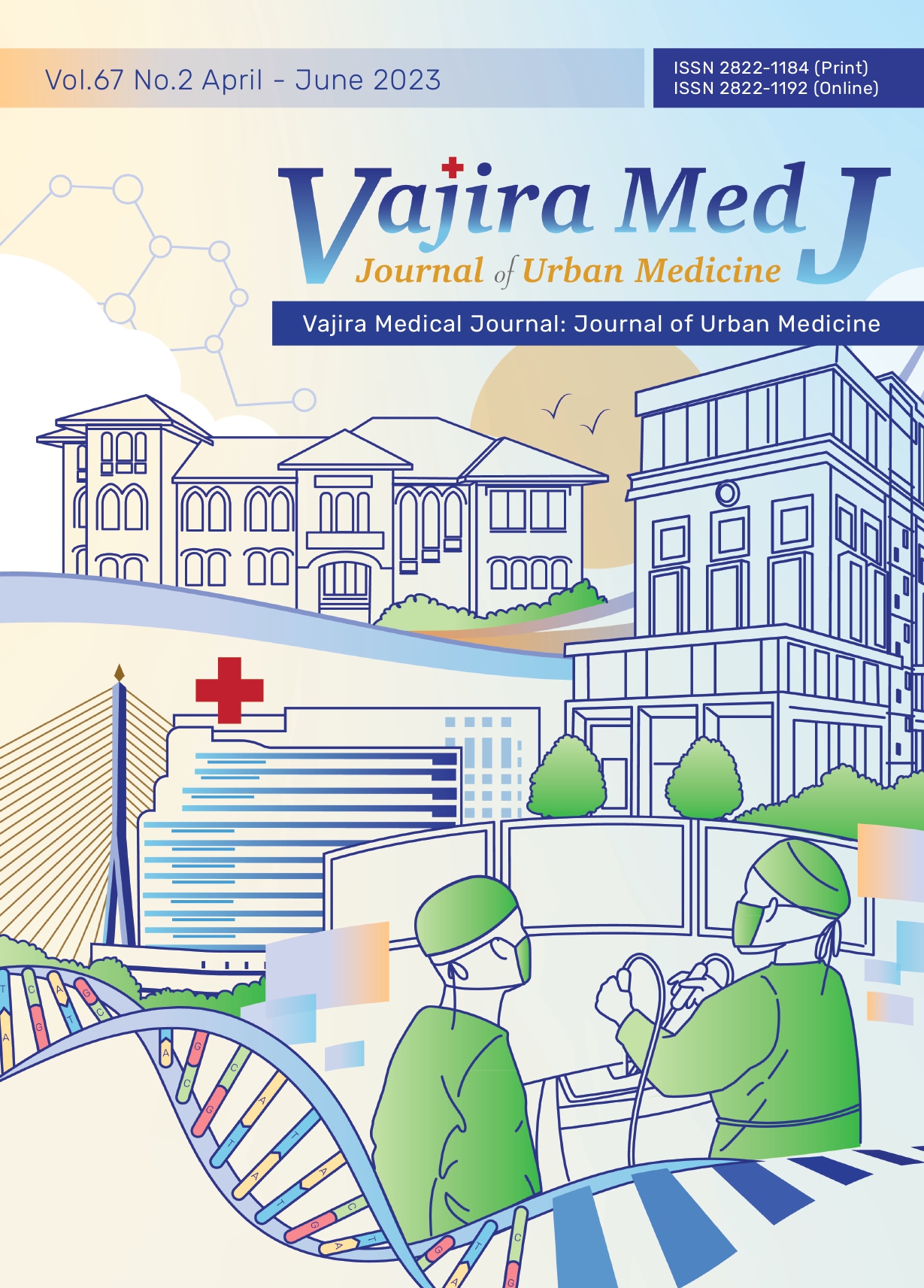A 5-Year-Retrospective Review: The Clinical Outcome between Adequate and Inadequate of Initial Antibiotics Treatment in Pediatric Patients, Vajira Hospital The Outcome between Adequate and Inadequate Empirical Antibiotics
Main Article Content
Abstract
OBJECTIVE: The results of adequate and inadequate empirical antibiotics remain unclear. This study aimed to evaluate the results of using adequate and inadequate empirical antibiotics.
METHODS: A retrospective cohort analysis that covered January 2017 and December 2021 was conducted. At Vajira Hospital, we enlisted pediatric patients with bacteremia and urinary tract infections (UTIs). Patient attributes, empirical antibiotics, therapeutic results, financial expenditures, and antibiotic susceptibility patterns were assessed.
RESULTS: In total, 286 pediatric patients were enrolled. There were 230 (80.4%), and 56 (19.6%) patients with UTIs and bacteremia, respectively. The organism that was found the most frequently was Escherichia coli (53.5%), while third-generation cephalosporin was the most often used empirical antibiotic (74.5%). Only 78.4% of Escherichia coli were vulnerable to third-generation cephalosporin.
Of 220 patients (76.9%) were treated with adequate empirical antibiotics. The outcomes in the adequate empirical antibiotics group revealed better-improved symptoms than inadequate empirical antibiotics group (96.4% VS 84.8%, p = 0.002).
CONCLUSION: Clinical outcomes among pediatric patients from adequate initial antibiotics groups were reported the better outcomes. The mortality rates were not different. Nonetheless, appropriate empirical antibiotics are needed. In UTI patients, amikacin is preferable options for empirical antibiotics.
Downloads
Article Details

This work is licensed under a Creative Commons Attribution-NonCommercial-NoDerivatives 4.0 International License.
References
Michaud CM. Global burden of infectious diseases. In: Schaechter, editor. Encyclopedia of Microbiology. 3rd ed. Academic Press; 2009. p. 444–54.
Abe T, Ogura H, Kushimoto S, Shiraishi A, Sugiyama T, Deshpande GA, et al. Variations in infection sites and mortality rates among patients in intensive care units with severe sepsis and septic shock in Japan. J Intensive Care 2019;7:28-36.
Wenzel RP, Edmond MB. The impact of hospital-acquired bloodstream infections. Emerg Infect Dis 2001;7(2):174-7.
Dellinger RP. Cardiovascular management of septic shock. Crit Care Med 2003;31(3):946-55.
Centers for Disease Control and Prevention. Urinary tract infection [internet]. 2021 [cited 2021 November 10]. Available from: https:// www.cdc.gov/antibiotic-use/uti.html
Urology Care Foundation. Urinary tract infections in adults [internet]. 2021 [cited 2021 November 10]. Available from: https:// www.urologyhealth.org/urology-a-z/u/ urinary-tract-infections-in-adults
Swanson D. Meningitis. Pediatr Rev 2015; 36(12):514-24.
World Health Organization. Antibiotic resistance [internet]. 2020 [cited 2021 November 10]. Available from: https://www. who.int/news-room/fact-sheets/detail/ antibiotic-resistance
Fraser A, Paul M, Almanasreh N, Tacconelli E, Frank U, Cauda R, et al. Benefit of appropriate empirical antibiotic treatment: thirty-day mortality and duration of hospital stay. Am J Med 2006;119(11):970-6.
Kang CI, Kim SH, Park WB, Lee KD, Kim HB, Kim EC, et al. Bloodstream infections caused by antibiotic-resistant gram-negative bacilli: risk factors for mortality and impact of inappropriate initial antimicrobial therapy on outcome. Antimicrob Agents Chemother 2005;49(2):760-6.
Marquet K, Liesenborgs A, Bergs J, Vleugels A, Claes N. Incidence and outcome of inappropriate in-hospital empiric antibiotics for severe infection: a systematic review and meta-analysis. Crit Care 2015;19(1):63.
Lambregts MMC, Wijnakker R, Bernards AT, Visser LG, Cessie SL, Boer MGJ. Mortality after delay of adequate empiric antimicrobial treatment of bloodstream infection. J Clin Med 2020;9(5):1378.
Savage RD, Fowler RA, Rishu AH, Bagshaw SM, Cook D, Dodek P, et al. The effect of inadequate initial empiric antimicrobial treatment on mortality in critically Ill patients with bloodstream infections: a multi-centre retrospective cohort study. PLoS One 2016;11(5): e0154944.
Hagel S, Pletz MW, Brunkhorst FM, Seifert H, Kern WV. Bakteriämie und sepsis [bacteremia and sepsis]. Internist (Berl) 2013;54(4):399-407.
Bates B. Interpretation of urinalysis and urine culture for UTI treatment. US Pharm 2013; 38(11):65-8.
Hung YP, Lee CC, Ko WC. Effects of inappropriate administration of empirical antibiotics on mortality in adults with bacteraemia: systematic review and meta-analysis. Front Med (Lausanne) 2022;9:869822.
Garnacho-Montero J, Ortiz-Leyba C, Herrera-Melero I, Aldabó-Pallás T, Cayuela-Dominguez A, Marquez-Vacaro JA, et al. Mortality and morbidity attributable to inadequate empirical antimicrobial therapy in patients admitted to the ICU with sepsis: a matched cohort study. J Antimicrob Chemother 2008;61(2):436-41.
Retamar P, Portillo MM, López-Prieto MD, Rodríguez-López F, de Cueto M, García MV, et al. Impact of inadequate empirical therapy on the mortality of patients with bloodstream infections: a propensity score-based analysis. Antimicrob Agents Chemother 2012;56(1): 472-8.
Davey PG, Marwick C. Appropriate vs. inappropriate antimicrobial therapy. Clin Microbiol Infect 2008;14 Suppl 3:15-21.
Bassetti M, Rello J, Blasi F, Goossens H, Sotgiu G, Tavoschi L, et al. Systematic review of the impact of appropriate versus inappropriate initial antibiotic therapy on outcomes of patients with severe bacterial infections. Int J Antimicrob Agents 2020; 56(6):106184.
Schuttevaer R, Alsma J, Brink A, van Dijk W, de Steenwinkel JEM, Lingsma HF, et al. Appropriate empirical antibiotic therapy and mortality: conflicting data explained by residual confounding. PLoS One 2019; 14(11):e0225478.
Lambregts MMC, Wijnakker R, Bernards AT, Visser LG, Cessie SL, Boer MGJ. Mortality after delay of adequate empiric antimicrobial treatment of bloodstream infection. J Clin Med 2020;9(5):1378-87.
Zhu H, Chen Y, Hang Y, Luo H, Fang X, Xiao Y, et al. Impact of inappropriate empirical antibiotic treatment on clinical outcomes of urinary tract infections caused by Escherichia coli: a retrospective cohort study. J Glob Antimicrob Resist 2021;26:148-53.
National Antimicrobial Resistant Surveillance Center, Thailand. Antibiograms [internet]. 2019 [cited 2022 May 10]. Available from: http://narst.dmsc.moph.go.th/antibiograms. html


